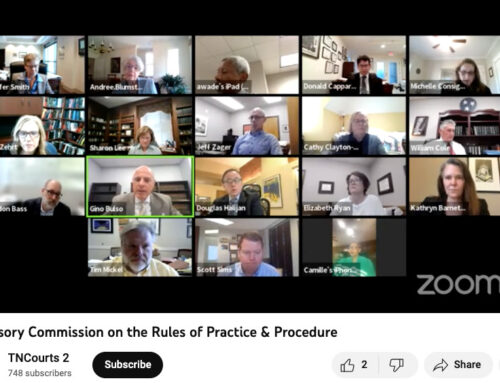State museum commission restricts speech, communication with the press
The Douglas Henry State Museum Commission adopted a new code of conduct on Monday that requires all commission members except for the chair and vice-chair to provide advance notification to the entire commission of any comments that they make to the public before making them.
The policy would cover any communication with the press, or any public comments or written comments. The commission also decided it would apply to social media.
“Should a Commissioner, excluding the Chair and Vice-Chair, publish any written statement, including blogs, or give any public statement regarding the Commission, Museum, Executive Director, or Museum personnel the Commissioner shall provide the Commission with an advance copy of the written content, or advance notice of the statement prior to its publishing or dissemination.”
Failure to give the commission advance notice would result in a forced resignation from the commission, according to the new discipline policies of the board.
Besides being logistically unreasonable, restricting someone’s speech and their communication with the press unless advance notice is given is controlling to a point that it would likely chill access to information about a government entity. It impairs the rights of individual commission members to make public comments by requiring them to provide notice to the commission before speaking.
The new Code of Conduct also includes these two rules:
10.6 Commission members’ interaction with the public, press or other entities must recognize the same limitation and the inability of any commission member to speak for the commission except to repeat explicitly stated Commission decisions.
10.7 Commission members will give no consequence or voice to individual judgments of the Executive Director or staff performance except when explicitly authorized by the Commission. Commission members shall not publicly disparage or malign the Museum, the Executive Director, or Museum personnel.
Cari Wade Gervin, a reporter with the Nashville Scene and Nashville Post, attended the commission’s meeting on Monday and wrote a lengthy story about the commission’s actions. State museum commission adopts stringent new code of conduct; New rules prohibit disparagement, require advance notice for speaking to press
Here are excerpts:
“Although (chairman Tom) Smith stated repeatedly the changes to the code of conduct were not singling out any one individual commissioner, the new regulations seem specifically designed to target one particular DHSMC member — Victor Ashe, who was just reappointed to the commission for another four years and has been a regular critic of some of the commission’s recent actions.”
“…Smith also said the new provisions cited above ‘are not intended to prevent transparency, to the contrary they require commissioners to be transparent to both the general public and the Commission in their actions. They do not preclude anyone from speaking with the media, they merely state the commissioner has a duty to inform the public that unless they’ve been authorized to speak to an issue by the Commission they must state that the opinions expressed are their own and not the Commission’s.’
But Smith’s comments during the meetings themselves belie that. ‘You can’t just go off the reservation,’ he said at one point of how the DHSMC should present a unified front. He also cited a column by Knoxville News Sentinel editor Jack McElroy about an adjunct professor recently fired by the University of Tennessee at Knoxville for a series of offensive Facebook posts.
“Freedom of speech means the government can’t tell you what you can and cannot say in public. That doesn’t mean your employer can’t, at least not if you want to keep your job,” Smith said, reading McElroy’s words.
The state museum commission is comprised of people appointed by lawmakers and the governor, and by law, includes the two lawmakers who chair the finance, ways and means committees of the House and Senate or their designees. Commission members are not employees of the state museum, but rather serve on its governing board. Tennessee House Speaker Beth Harwell is on the commission.
All commission members are required to sign the new code of conduct, and agree to resign if they violate it.
The code does not spell out what will happen if a commission member submits comments to the commission in advance and the chair or vice chair respond that the commissioner’s planned comments would be considered a disparagement that would violate the code of conduct.
But it include a clause that says if the commissioner “commits willful misconduct of office… the Commission member shall be subject to removal in accordance with applicable laws and procedures.
Here is a link to the Code of Conduct presented to commissioners at Monday’s meeting. Some small changes were made to parts of it during the meeting that have not been incorporated into this version.
(Note of disclosure: Victor Ashe became of a member of the TCOG board of directors last year. The Nashville Post reported that last fall, Sharon Dennis who was executive assistant to the executive director, wrote in an email questioning whether Ashe’s “service and monetary support” of the open government coalition would violate the code of conduct.)





